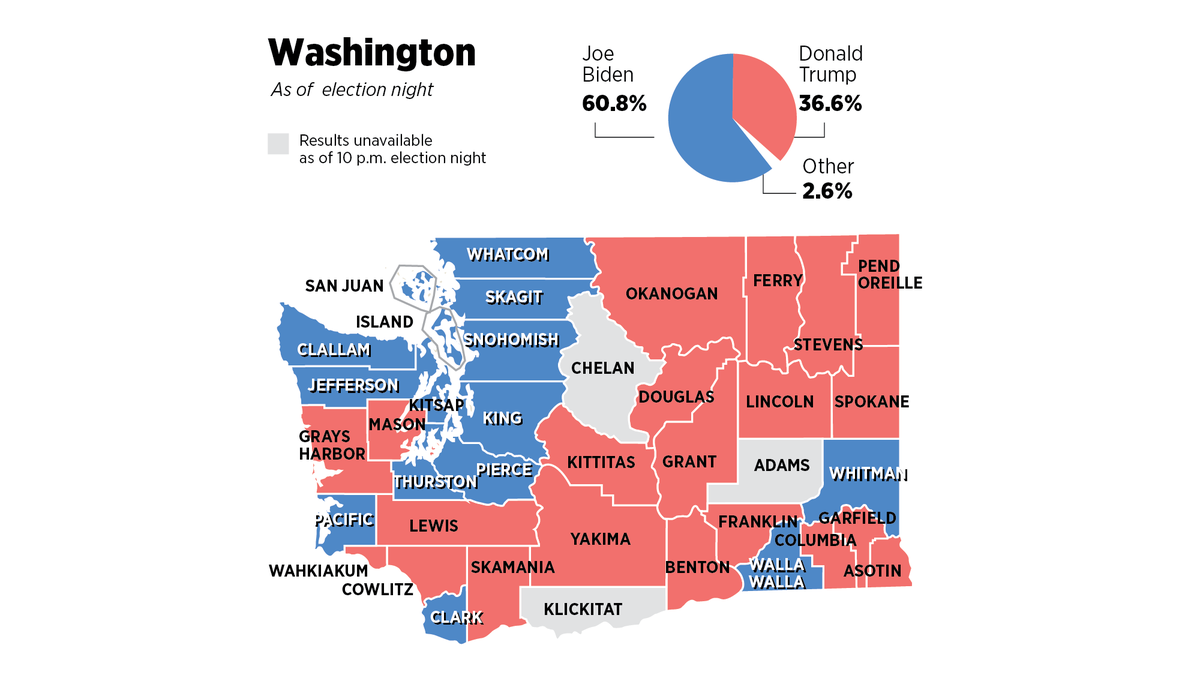Is it over yet? Not for the presidential race, but most others are settled

After more than a year of campaigning, months of political commercials, a series of presidential debates and a week of nearly nonstop news coverage of rallies and countercharges, American voters may be waking up this morning with one question.
Is the long and painful gantlet we call the election over yet?
The answer: No and yes.
The presidential race is in doubt and may be for days as some states count late votes and others count those cast early but not yet processed. There will be arguments, and possibly legal action.
Shortly before midnight Pacific time, incumbent Donald Trump claimed victory, said the counting should stop in Pennsylvania, Wisconsin and Michigan and was prepared to go to the U.S. Supreme Court to make that happen.
“This is a fraud on the American public. We want all voting to count,” he said. “We will win this and as far as I’m concerned we already have.”
He did say voting should continue in Arizona, where he was trailing Biden.
Earlier in the night, challenger Joe Biden said counting should continue and he expected when all ballots were tabulated he would win.
Shortly after midnight, Biden was slightly ahead in the all-important Electoral College count from states where the results are known, but Trump was ahead in states where the outcome is in doubt. Pennsylvania, Wisconsin and Michigan, which gave the presidency to Trump four years ago, will likely decide the race.
Whoever wins the White House could have a split Congress – a Senate controlled by Republicans and a House controlled by Democrats.
Most of the statewide races for executive offices in Washington, however, have one candidate far enough ahead of the other that it’s safe to say it was a good night if you were an incumbent Democrat, not so much if you were a Republican.
Gov. Jay Inslee got a third term, as did Attorney General Bob Ferguson. Lands Commissioner Hilary Franz and State Auditor Pat McCarthy got a second term and Insurance Commissioner Mike Kreidler got a sixth. Superintendent of Public Instruction Chris Reykdal, in a nonpartisan office but with Democratic credentials from a stint in the Legislature, also got a second term.
State Treasurer Duane Davidson, a Republican, lost his seat to Democratic Rep. Mike Pellicciotti. At the end of the night, Secretary of State Kim Wyman was looking at the prospect of being the only statewide Republican, and her Democratic opponent, Gale Tarleton, was vowing to fight on until all votes are counted. In Washington, that could be about three weeks, and longer if the race is close enough for a recount.
Democrats kept control of both houses of the Legislature and may have picked up two seats in the Senate.
Any suggestion that the election should be over at 12:01 a.m. on Wednesday ignores history and facts.
The presidential election is designed to take time in America. That’s why the election is in November, the Electoral College meets in December and the president isn’t inaugurated until January. Before 1933, inauguration wasn’t until March.
We vote on the first Tuesday after the first Monday in November because in earlier agrarian America the crops would be harvested by the middle of autumn and people who had to go a long distance to cast their ballots could travel on Monday after attending church on Sunday.
Time was, and still is, built in to collect, count and certify ballots. In Washington, counties have three weeks to certify their results, and the state totals aren’t final for one month.
Those results aren’t subject to recount until they are certified.
After the Electoral College meets, the results have to be reported to Congress, which would have to pick the president if neither gets 270 electoral votes.
All of this doesn’t sit well in an era when information is available instantaneously by clicking on a link or feeding a question into a search engine. But it’s the way things have been for much of U.S. and Washington history.
Four presidential elections wound up without a clear Electoral College winner. In 1960, John Kennedy and Richard Nixon went to sleep not knowing which one would be the next president. The 2000 presidential race was settled by a U.S. Supreme Court ruling on how to count votes in Florida.
The 2004 Washington governor’s race required two recounts, and was finally settled with a lawsuit some five months after Democrat Chris Gregoire was sworn in.
All of those elections were controversial, but the nation and state survived.
There’s a saying that the opera isn’t over until the fat lady sings. For most races in Washington and around the country, she’s reaching the final notes. For the presidential race, she’s may be only warming up her voice.